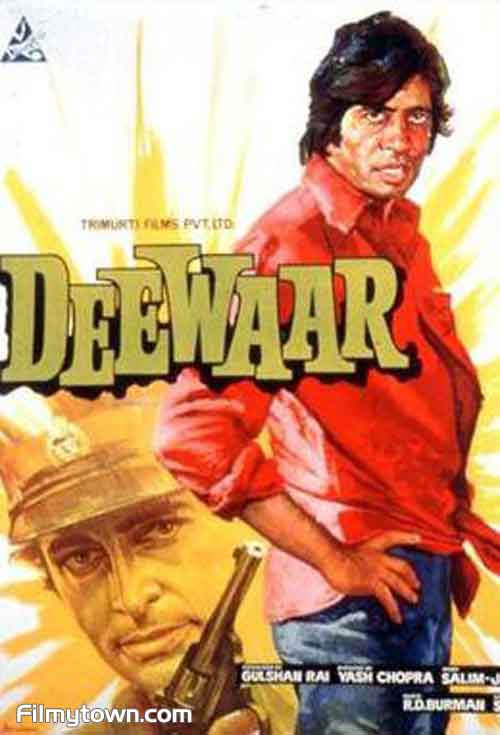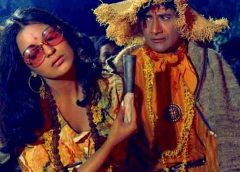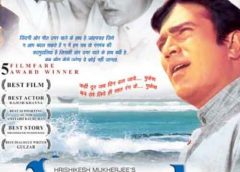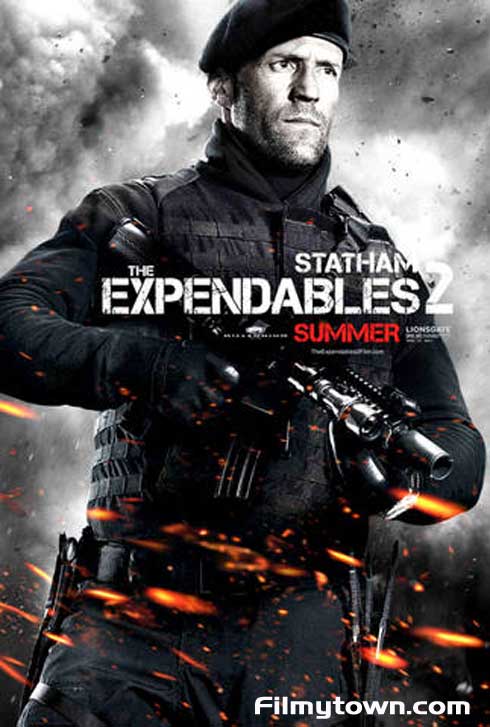Another iconic movie released on 24th January 1975, a few months before Sholay was Deewar – a tale of two brothers on opposite sides of the law. It explored the relations between siblings who grew up under the shadow of their father’s unfortunate disrepute and how each of them took that slander and grew in two opposite directions, one who cannot forget and forgive, becomes a street smart, law-breaker and the other who moves on with the times and is an educated person on the right side of the law.
The title – Deewar thus suggesting the wall of ideology drawn between them. This movie was iconic as it was released before Sholay and after Zanzeer and firmly established Amitabh Bachchan as the new superstar of that era and confirmed his image of the ‘Angry Young Man’. With this movie he established an enduring partnership with Shashi Kapoor with this duo giving many subsequent hits to Bollywood in the trend of multi hero movies of those times.
Deewar was also the movie which gave Big B the now famous screen name Vijay which was successfully used for many of his characters in subsequent movies. It is in the action and drama genre. Many of its scenes picturized on Big B and some between the two brothers are remembered to this day. Amitabh’s character was supposed to have been modelled partially on the then renowned don Haji Mastan’s life. With this movie, the underworld achieved glorification in the Indian film industry and heroes were not afraid to play roles with grey shades after this.
The movie opens with the younger brother Ravi (Shashi Kapoor- suave and loud-always played a reliable second fiddle to the Big B) receiving a medal from the police department for his exemplary service and dedicates it to his mother (Nirupa Roy-quintessential mother of those times) and from here the flashback begins it takes us back by 20 years or so in the past where the two are sons of a union leader Anandbabu (Satyen Kappu) who works in the coalfields and is deceived by his boss to sellout the workers at his own terms unable to bear the barbs of the locals runs away leaving behind his family. In the meantime the elder son Vijay has to bear the brunt of the people of the workers colony which make him rebellious and angry with a volcano ready to erupt. To escape the ignominy, Anandbabu’s widow along with the two children moves to Mumbai (Bombay or Bambai as it was called then).
As shown in many movies the heros’ mother works on a construction site, this was typical metaphor for city of dreams Mumbai which was developing into an all-encompassing metro, embracing people of all regions and religion providing them food but the home was always under construction, for those who were opportune and grabbed it this city could make them millionaires and those not so lucky did get food but stayed where they were. With time the two grow up Ravi an educated young man rearing to go and Vijay working as a stevedore on the docks.
This is where the opportunity strikes an incident changes something within him and the volcano erupts and Vijay grabs the opportunity with the scruff of its neck literally and beats up the dock mafia. This opens the doors for him to the underworld, Daavar (Iftekhar-elegant as ever) is a don who offers him position and riches. The younger brother on the other hand is searching for employment after completing graduation and joins the police force. This is where the roads diverge for both of them and both their careers are shown parallel and growing in stature. Vijay has the grasp of what he will be dealing in the future. They both have their own love interests Anita (Parveen Babi- beautiful) and Veera (Neetu Singh-affable).
This was another gem from the stables of the dynamic duo of Salim-Javed. Directed by the peerless Yash Chopra who has given Hindi Cinema or Bollywood many super-duper hits. The movie ran to packed houses for over 100 weeks and was proclaimed a block buster. It had such an impact then that it spawned many remakes not only in different Indian languages but also some foreign movies were also inspired by it, it was considered as a turning point of Indian cinema in many ways and sort of a cult film. The fight techniques employed during fight sequence were novel and changed the trend for fights in movies from the traditional to the more modern all-encompassing styles which included such imported styles as karate etc.
Some scenes and the dialogues of Deewar were a rage. The time when the workers tattoo the words ‘Mera baap chor hai’ on child Vijay’s hand and which haunts him all his life, then the scene where a young boot polisher Vijay tells Daavar ‘ main faike hue paise nahi uthata’ and repeats it when he meets him again as an adult.
Another noteworthy scene is where Vijay bashes up the dock mafia, the scenes where the badge no. 786 saves his life many times, the scene where the two brothers argue as to who is bigger in stature and with whom their mother will live and which ends with the dialogue by Ravi ‘Mere paas maa hai’ which is still quoted in some contemporary movies, then the most famous scene where Vijay loses his badge and is hit by his brother’s bullet and the atheist that he has been all his life he finally enters the temple and has a one to one with the God’s idol and dies in his mother’s lap. This particular scene was very difficult to act but only Amitabh could pull it off as he did in similar scenes in his later movies.
Apart from being a super hit Deewar also won the Best Movie Filmfare award for that year. Not to be missed is also in the list of top 25 Hindi movies of all times.
DEEWAR – a Bollywood Retro Gem revisited by PAWAN GUPTA
(Image courtesy – Wikipedia)





